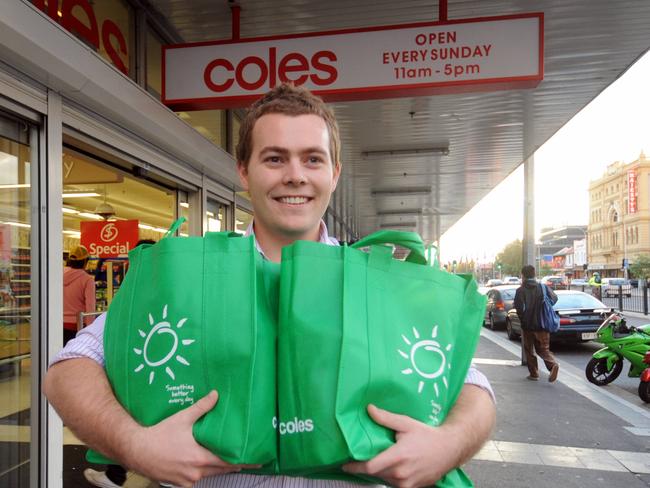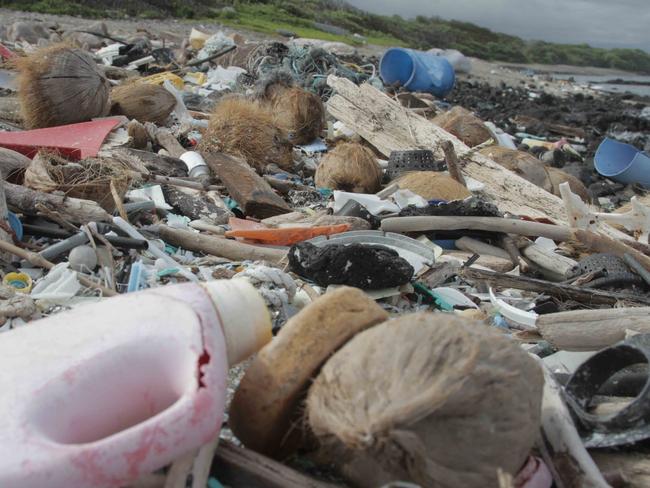The crazy truth about using green bags
THINK you are doing the right thing by using a green bag? You might be shocked to learn what you need to do to actually make it worthwhile.
NEXT time you are tempted to buy one of those green bags at the supermarket — remember you have to use it at least 104 times to make a difference to the environment.
Green bags commonly sold at Coles and Woolworths are made of polypropylene (a type of plastic) and take more material and energy to produce than standard single-use plastic bags given out for free.
Shoppers are often encouraged to buy the green bags as a more environmentally-friendly option because they can be reused. But you don’t get the benefits unless you continue to reuse it constantly.
A 2009 study found that if the green bags were only used 52 times (weekly for a year) then the impact on global warming was actually greater than single-use bags.
Author of the study, Associate Professor Karli Verghese from RMIT told the ABC a green bag needs to be used 104 times (weekly for two years) to make it worthwhile.
Overall the benefits of reusable bags can vary depending on what materials they are made out of, how much energy or water is used to make them and whether they can be recycled or have to be sent to landfill.
The study found it took more material and energy to make the green bags than ordinary single-use plastic bags.
Calico bags made from cotton are the only reusable bags likely to be better for the environment than single-use plastic.
It’s just one of the traps people trying to do the right thing can fall into.
But that doesn’t mean we should continue using plastic bags.
Ten million plastic bags are used by Australians every day and 85 per cent of these bags and other packaging end up in landfill.
While supermarkets have started offering recycling of soft plastics, the ABC series War on Waste has highlighted the difficulty in ensuring they are actually recycled.
The other difficulty is that a plastic bag can’t be recycled into another plastic bag, it can also only be “downcycled” into products like park benches and garden materials, and this relies on businesses finding customers who want to buy these products.

Plastic waste can also find its way into oceans and it’s estimated that by 2050, there will be more plastic by weight in the ocean than fish.
“On average a plastic bag is used for just 12 minutes, so that’s 12 minutes carrying your groceries to the car (and) the pantry and after that it’s tossed away and it takes 1000 years to break down,” The Project host Waleed Aly said recently.
“So your great, great, great, great, great ... grandchildren will share a planet with the plastic bag that you just used to bring home tonight’s dinner.”
RELATED: The harm you’re causing when you accept plastic

This is partly the reason why so many people are moving towards a zero waste lifestyle. While this does encourage recycling, especially things like aluminium and glass that can be recycled endlessly, adherents generally avoid plastic — even if it can be recycled — because of its harmful impacts.
RELATED: My year of trying to live zero waste
There is currently a Ban the Bag campaign underway to get the state governments in NSW, Victoria and Western Australia to get rid of plastic shopping bags. Other states and territories already have a ban in place.
A change.org petition has been signed by more than 140,000 people. Residents are also being encouraged to write to their state premiers.
A separate petition for supermarkets to reduce food waste and relax cosmetic standards has also got 34,000 supporters.
War on Waste host Craig Reucassel also wants to see existing bans in other states tightened because plastic bags are still being used — supermarkets are simply charging customers for thicker bags.



